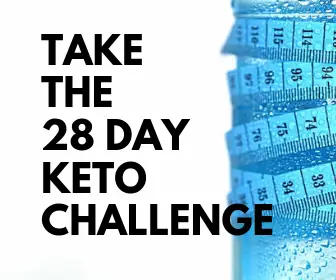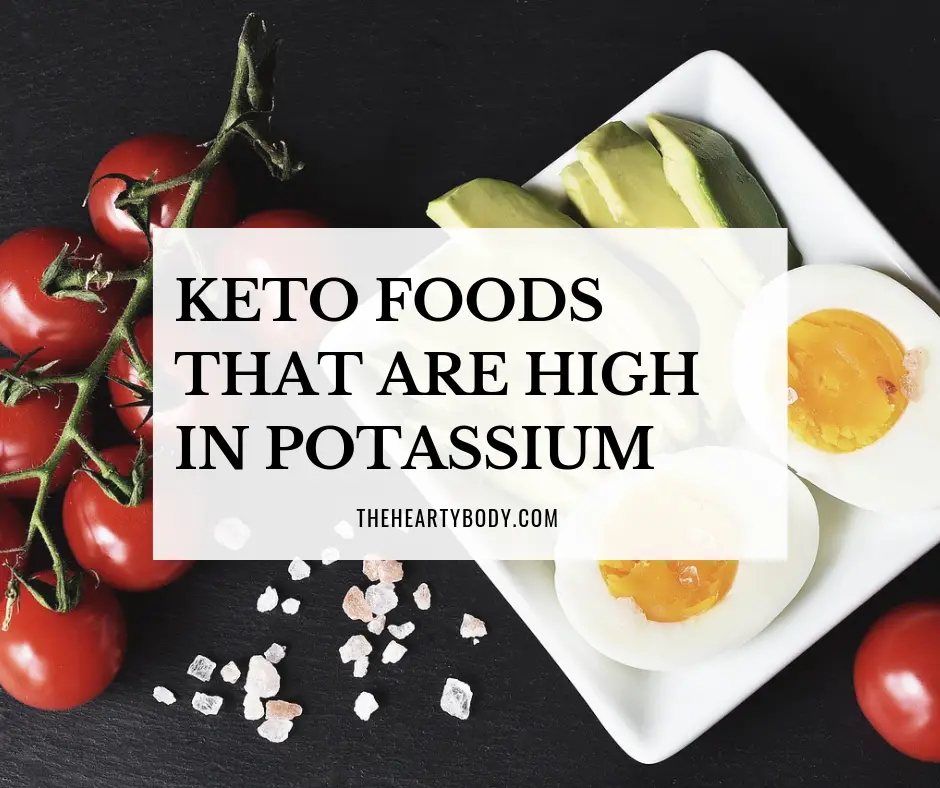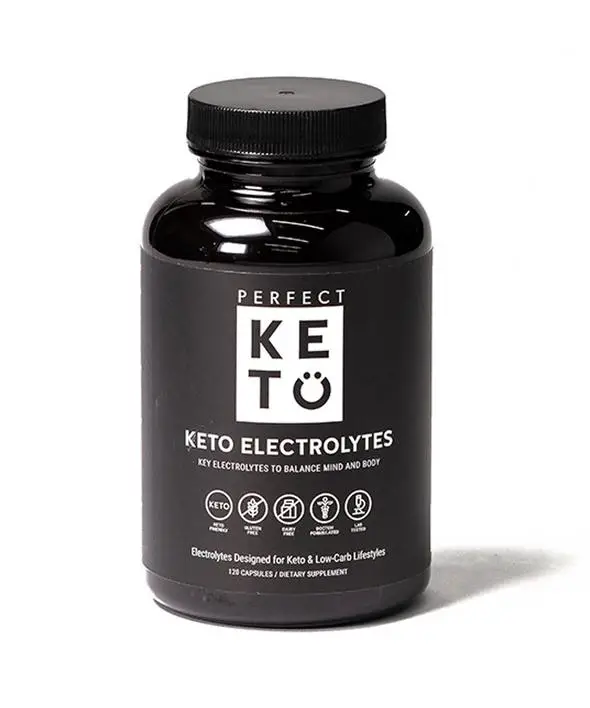Many keto gurus say over and over how you need to pay attention to your electrolytes when you are on the keto diet. One of these electrolytes they are talking about is potassium. In this post we find out which keto foods are high in potassium.
Why should you worry about finding keto foods that are high in potassium?
Potassium is an electrolyte that your body requires and cannot make on it’s own. This means that you must find sources of potassium since your body cannot make this essential mineral.
Potassium is needed by your body for everyday functions such as balancing your body fluids and maintaining proper muscle function.
When you are on a keto diet it is very important to make sure you reaching your body’s needed levels of potassium each day.
That can be harder to do when your foods are limited due to carbohydrate restriction. While there are many foods that are rich in potassium, only a small percentage of those are keto friendly foods.
What is Potassium?
Potassium is one of three main electrolytes your body requires for fluid balance and proper muscle function. The other two of the three main electrolytes are sodium and magnesium. Other electrolytes beyond the big three are calcium, chloride, and phosphate.
What Do Electrolytes Do?
- Maintain proper muscle contractions.
- Regulate your heartbeat.
- Manage your body temperature.
- Maintain proper neurological function.
- Help with energy production.
- Help maintain bladder control.
- Regulate your body’s fluid levels.
- Help your blood to clot.
- Help build new tissue.
As you can see from that list, it’s pretty important to make sure you have your electrolytes in sufficient quantities and in balance.
Potassium in Relation to Sodium
Potassium itself is part of a very important process that is known as the sodium-potassium pump. The sodium potassium pump is essential to bodily processes, like helping your heart pump, your blood to circulate, and allowing your nerves to have messages passed along.
Due to the relationship between sodium and potassium in these very vital functions the body must keep a certain balance of electrolytes for these functions to work without a hitch.
The average person should be getting at least 4,700 mg or potassium each day and only 1,500mg of sodium. But most people are getting 2,700mg of sodium each day and 2,900mg or potassium (source).
As you can see, due to salt being very abundant in today’s modern processed foods and being very inexpensive, many people get much more than the 1,500mg of sodium. With the body’s need to keep sodium and potassium in a certain balance . Thus with high sodium levels in the body, potassium levels drop as a result (source). As you can see many people now actually suffer from low potassium.
What Happens When You Are Low On Potassium?
Symptoms that you don’t have enough potassium:
- Physical Fatigue
- Mental Fatigue
- Severe Headaches
- Moodiness/Irritability
- Inability to Sleep
- Heart Palpitations
- High Blood Pressure
- Dehydration
- Swelling of the glands or tissues.
- Weight Gain
- Muscle Cramps
- Muscle Weakness
- Muscle Aches
- Constipation
- Nausea
- Stomach Cramps
- Bloat
Many of these symptoms can be improved with an increase in dietary potassium.
However there are some health conditions that can increase your body’s chances of not being able to regulate potassium levels. These include high corticosteroid levels, ACE inhibitors, kidney disease, diabetes, alcoholism, gastrointestinal issues, intense activities without adequate hydration and electrolyte replacement, folic acid deficiency, and side effects from certain medications (source).
Too Much Potassium
While a overdose from potassium is rare there are some things that can cause this such as being on dialysis, cancer treatments, or kidney disease/problems, Adrenal insufficiency, type 1 diabetes, excessive use of potassium supplements, among others according to the Mayo Clinic.
Potassium on Keto
Potassium is something you must pay extra attention to when you are on a keto diet.
When carbohydrates are eliminated from your diet your bodies glycogen stores are depleted. Your body stores three grams of water with each gram of glycogen.
When you are loosing your glycogen stores on a keto diet you are also flushing out electrolytes.
Keto Foods You Can Eat That Are High In Potassium
*all values are from the USDA website unless otherwise noted.
In order of highest concentration to lowest per 100 grams:
Pumpkin Seeds
Potassium per 100g of Pumpkin Seeds: 919mg.
19.5% of your recommended daily value of potassium.
Flaxseeds
Potassium per 100g of Flaxseeds: 813mg.
17.2% of your recommended daily value of potassium.
Almonds
Potassium per 100g of Almonds: 733mg.
15.5% of your recommended daily value of potassium.
Dark Chocolate
Potassium per 100g of Dark Chocolate: 715mg.
15.2% of your recommended daily value of potassium.
Wild Caught Salmon
Potassium per 100g of Wild Caught Salmon: 628mg. (source)
13.3% of your recommended daily value of potassium.
Clams
Potassium per 100g of Clams: 628mg.
13.3% of your recommended daily value of potassium.
Spinach
Potassium per 100g of Spinach: 558mg.
11.8% of your recommended daily value of potassium.
Octopus
Potassium per 100g of Octopus: 535mg. (source)
11.3% of your recommended daily value of potassium.
Halibut
Potassium per 100g of Halibut: 528mg. (source)
11.2% of your recommended daily value of potassium.
Yellowfin Tuna:
Potassium per 100g of Yellowfin Tuna: 527mg. (source)
11.2% of your recommended daily value of potassium.
Pompano
Potassium per 100g of Pompano: 527mg. (source)
11.2% of your recommended daily value of potassium.
Snapper
Potassium per 100g of Snapper: 522mg. (source)
11.1% of your recommended daily value of potassium.
Avocado
Potassium per 100g of Avocado: 485mg.
10.3% of your recommended daily value of potassium.
Taro Leaves
Potassium per 100g of Taro leaves: 460mg. (source)
9.7% of your recommended daily value of potassium.
Pollock
Potassium per 100g of Pollock: 430mg.
9.1% of your recommended daily value of potassium.
Pork
Potassium per 100g of Pork: 423mg.
9% of your recommended daily value of potassium.
Chia Seeds
Potassium per 100g of Chia Seeds: 407mg.
8.6% of your recommended daily value of potassium.
Sardines (Canned in Oil)
Potassium per 100g of Sardines: 397mg.
8.4% of your recommended daily value of potassium.
Brussels Sprouts
Potassium per 100g of Brussels Sprouts: 389mg.
Thats 8.2% of your recommended daily value of potassium.
Swiss Chard
Potassium per 100g of Swiss Chard: 379mg.
8% of your recommended daily value of potassium.
Trout
Potassium per 100g of Trout: 377mg.
8% of your recommended daily value of potassium.
Cuttlefish
Potassium per 100g of Cuttlefish: 354mg. (source)
7.5% of your recommended daily value of potassium.
Bluefin Tuna:
Potassium per 100g of Bluefin Tuna: 323mg. (source)
6.8% of your recommended daily value of potassium.
Beef
Potassium per 100g of Beef: 318mg.
6.7% of your recommended daily value of potassium.
White Mushrooms
Potassium per 100g of Mushrooms: 318mg.
6.7% of your recommended daily value of potassium.
Broccoli
Potassium per 100g of Broccoli: 316mg.
6.7% of your recommended daily value of potassium.
Cauliflower
Potassium per 100g of Cauliflower: 299mg.
6.3% of your recommended daily value of potassium.
Zucchini
Potassium per 100g of Zucchini: 261mg.
5.5% of your recommended daily value of potassium.
Bok Choy
Potassium per 100g of Bok Choy: 252mg.
5.3% of your recommended daily value of potassium.
Coconut Water
Potassium per 100g of Coconut Water: 250mg.
5.3% of your recommended daily value of potassium.
Canned Tuna
Potassium per 100g of Canned Tuna (in Water): 237mg. (source)
5% of your recommended daily value of potassium.
Eggplant
Potassium per 100g of Eggplant: 229mg.
4.8% of your recommended daily value of potassium.
Turnip Greens
Potassium per 100g of Turnip Greens: 203mg.
4.3% of your recommended daily value of potassium.
Supplements You Can Use On Keto for Potassium
There are times that you might not be able to get in the potassium you need during that day from whole foods and you might find that you need to supplement your potassium.
Keto Electrolytes Supplement
Perfect Keto has an electrolyte supplement that is specific for keto dieters. This supplement contains 4 electrolytes that are essential for you when you are on the keto diet. Those 4 electrolytes are potassium, sodium, magnesium, and calcium. You can find out more at PerfectKeto.com .
As you can see, just because you are on the keto diet does not mean you are very limited on keto friendly foods that are high in potassium or supplements for potassium. As long as you concentrate on whole foods and supplementation when necessary you can easily meet your daily potassium requirements.




